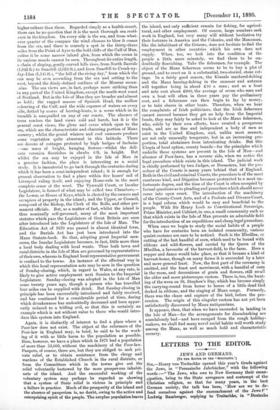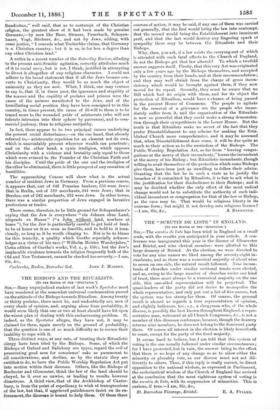LETTERS TO THE EDITOR.
JEWS AND GERMANS.
[To FHB EDITOR OF TH1 " SPECTA1OR:1 Sin,—Henry von Treitschke opened this year's tirade against the Jews, in " Prenssische Jahrbiicher," with the following words :—" The Jews, who owe to New Germany their eman- cipation, bring to the State arrogance and contempt of the Christian religion, so that for many years, in the best German society, the talk has been, How are we to de- fend ourselves against the encroachment of the Jews ly " Ludwig Bamberger, replying to Treitschke; in "Deutsche
Rundschau," well said, that as to contempt of the Christian religion, the greatest show of it had been made by genuine Germans,—by men like Baur, Strauss, Feuerbach, Schopen- littler, Vogt, Biichner, &c., and not by Jews, adding, with some justice, "I concede what Treitschke claims, that Germany is a Christian country ; but it is so, in far less a degree than any other Christian land."
A writer in a recent number of the Saturday Review, alluding to the present anti-Semitic agitation, correctly attributes much of it to social envy, but is not, I think, justified in attempting to divest it altogether of any religious character. I could not adhere to his broad statement that if all the Jews became con- verts to Christianity, they would be as much the object of animosity as they are now. What, I think, one may venture to say is, that if, in times past, the ignorance and stupidity of the masses and the cupidity of prelates and princes were the cause of the animus manifested to the Jews, and of the humiliating social position they have been consigned to in this
country, in times present, the cause of to them is to be traced more to the wounded pride of aristocrats (who will not -tolerate intrusion into their sphere by parvenus), and to com- mercial jealousy, than to religious antipathy.
In fact, there appear to be two principal causes underlying the present social disturbance,—on the one hand, that already referred to,—aristocratic repulsion for an element not its own, which is unavoidably present wherever wealth can penetrate; and on the other hand, a cynic irreligion, which opposes Christianity with a violence and brutality only equal to those which were evinced to the Founder of the Christian Faith and his disciples. Until the pride of the one and the irreligion of the other be eliminated, there is little prospect of any cessation of hostilities.
The approaching Census will show what is the actual number of resident Jews in Germany. From a previous census, it appears that, out of 642 Prussian bankers, 550 were Jews; that in Berlin, out of 519 merchants, 444 were Jews; that in Breslau, out of 242 merchants, 212 were Jews. In other towns, there was a similar proportion of Jews engaged in lucrative professions or trades.
There seems, therefore, to be little ground for Schopenhauer's saying that the Jew is everywhere " ein Johann ohne Land, nirgends zu Hanse" (" a John withenkland, nowhere at home "), for the Jew is particuslarly careful to get hold of land. to be at home on it as soon as feasible, and to hold to it tena- ciously, as long as it be worth clinging to. Nor is he to blame for this tenacity, a quality which Goethe especially acknow- ledges as a virtue of his race (" Wilhelm Meister Wanderjahre," 'Cotta edition of Goethe's works, Vol. x., p. 158); but the Jew's implacable virulence towards the religion frequently both of the Old and New Testament, cannot be checked too severely.—I am, Sir, &c., Carl smite, Baden, December 3rd. JOHN J. MADDEN.







































 Previous page
Previous page